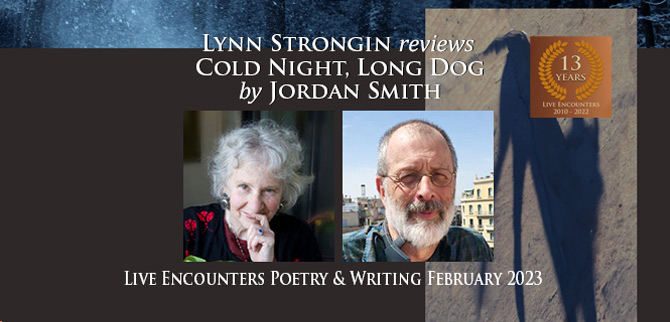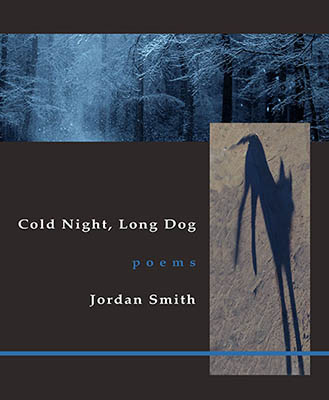
Download PDF Here
Live Encounters Poetry & Writing February 2023
Book review of Jordan Smith’s Cold Night, Long Dog by Lynn Strongin.
Ambidextrous Bloodhound Press, December 2022.
To purchase, contact Jordan Smith at smithj@union.edu

Jordan Smith’s Cold Night, Long Dog is a beautifully crafted book, a pilgrimage, a quest for calm acceptance even in a state of lost hope, disappointment. Kintsugi, a Japanese word for broken pottery whose cracks are mended with gold, mends the flaws of life. This work is widely referential. And reverential. An anonymous troubadour wanders thru its pages “To see a little to one side / where flame and flame’s shadow open their hands.” There are references to Basho and Auden, I Ching and Dao. Poems scroll down, like Chinese scrolls but in the American vein either detailed: “a two-bedroom house / On West Church Street” or sweeping, Whitmanesque views of the Hudson River Valley. How to survive at wit’s end the poems explore with provisional answer.
Music and art are the saving graces. Smith’s body of work communicates a love for the old hymns: a passion for music echoing a troubadour’s imagined song, perhaps from Anjou. Jazz, America’s classical music, echoes in “Listening to the Opera.” Rhyme is used to subtle effect no more with its opposite, encore. Smiths are quite consistently earth colors, colors reminiscent of Bruegel: the great master artist creates teals which bend the heart, dark, long nights hover over his bent, poverty-stricken peasants in the medieval world; the world does not change. The second pandemic summer, ironically, has an eerie glow. In a favorite, “Poem Beginning with a Line Misattributed to one of the troubadours,” the line is quoted, “Life got complicated, and the pears aren’t ripe.” One puzzles how the two are the pears not ripe? the lover may not have been accepted; harvest might have been delayed by the lady’s husband. This is a universal plight but locating it in Anjou suggests the uniquely shaped golden color of the pears. The predicament is looked at from various positions becoming more and more complex like a revolving object. Finally, the poet addresses the world in a time in which the plague might have abated. One gets ‘a taste for the grit left at the bottom of the tiny cup. In “The Distinguished Thing,” one imagines “the knife-edge we climbed / carrying an empty bowl that begged to be broken.”
“Written in the Flyleaf of a Biography” one wishes a book to continue, “The one to redeem all the others.” The riddle of the Sphinx, or “Wyatt’s Riddle” is that one has “Little time left”. A momentary enchantment lapses, the mainsail of a little boat. . . All life becomes labor again, one closes notebooks, caps pen and, most importantly, caps wit: one is left “at wit’s end.” This sense being at wit’s end is followed by the title poem asking what color is a “plague sky” Smith references the great Bruegel painting of winter, hounds after spare catch over a teal iced lake, leading downhill. Bosch has a fierier sense of impending doom. Beginning with a plague sky, Smith’s last line echoes the bible “On earth as it is in heaven.” The clarity of freezing night with the lights of home looms. Suddenly the disturbing out-of-kilter image of the black dog appears beside the poet, coat glistening. The dog arcs us back to Breugel linking medieval with modern world. Nothing changes. Hunters return to an unchanged village; taste of ash is everywhere, the lover fled. “Wyatt’s Riddle” is a poem that floats, a rather ethereal, Oriental atmosphere of catching wind in a net. This environment is rare in Smith’s work.
“There are prophets who tremble as the mode of music changes” (“Near Disasters.”) There is always further misfortune.” But mystically, the gatekeepers or custodians do arrive. “They tune their radios to the new station, they hum along.” The prophets have the last word, staying outside the door waiting “to tell us how wrong we always were,” a thing we knew always.
Standing back from the canvas of, Cold Night, Long Dog, foreboding is a backdrop In the final analysis, where has this pilgrimage of the nameless ageless troubadour (who can be each one of us) led? it’s hard to love a world so harsh and arbitrary. Wyatt’s riddle is that we cannot catch the wind in a net. Jordan, It calls to mind Basho’s “snow-viewing party.”
This is an oblique look at history, a book written in the wisdom of age knowing texts are left undiminished “and that suppleness wins over grip.” The conclusion of “The Distinguished Thing” reminds me of Basho, too” we climb “Carrying an empty bowl that begged to be broken.” If it is broken, it will be mended with gold.
If there is an overall message it’s that “the soul must prepare itself for life’s work whose name is death.” Brilliant details convey the intrusion. (“The basement bookshop” the “dark beer at Pfaff’s”.). “Listening to the Opera,” evokes” a grandmother’s room stacked with old 78, her Victor Book of the Opera. One can smell lavender, see old lace in the house On West Church Street The grandmother vanishes with little sound more “Than the hiss at the record’s / End.” One speaks of the papery things of age.
“A little Noir Music” puts “Some brightness in the tone” which is a brightness of moon. The poet, however, winds up: ‘Put the knife in your right pocket.’ This is the noir.
I keep going back to the melding of opposites; dove-tailing aura with acceptance of memory fading out and in at times evoking the ghostly. Both dark and light make the images of the final poem (dedicated to Marvin Bell,)“Questioning the Dead Man” In one poem, the dead man is described as “perspective itself, the universal fixed to a pinpoint. …” one of Smith’s mentors and Marvin Bell’s main work is The book of the Dead Man” which, as the New York Times points out, he has been writing for a quarter of a century beginning at age fifty three. “While the Zen admonition — Live as if you were already dead — may embody a lively challenge, these poems, too, tip their hats with greatest respect and fanciful care for the living mystery that holds us all.” (Naomi Shibab Nye. Strongly influenced by Bell, Smith closes the book with an acceptance of reticence, in the contradictory title of the poem. the Kintsuri, the gift and precious metal thread mending cracks which helps us accept our flaws with grace.
© Lynn Strongin
Lynn Strongin is a Pulitzer Prize nominee in poetry. A recipient of a National Endowment Creative Writing Grant, nominated twice for Pushcart Prizes, Lynn Born in NYC at the end of the dirty thirties, she grew up in an artistic Jewish home in New York during the war. Earliest studies were in musical composition as a child and at The Manhattan School of Music. Took a BA at Hunter college, MA at Stanford University as a Woodrow Wilson Fellow. Lived in Berkeley during the vibrant sixties where she worked for Denise Levertov and took part in many peace demonstrations. Poems in forty anthologies, fifty journals; Poetry, New York Quarterly. Forthcoming work in Poetry Flash and Otoliths. Canada is her second home.
The late Hugh Fox said Strongin is the “most exciting poet writing today.’ Danielle Ofri wrote to her, “you tear the veil off that mysterious disease polio.” Strongin’s work has been translated into French and Italian. Her forthcoming book is THE SWEETNESS OF EDNA. She recently received a ten-thousand dollar George Woodcock Grant for Writers. This grant has greatly facilitated her work at the present time.

